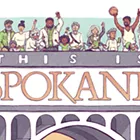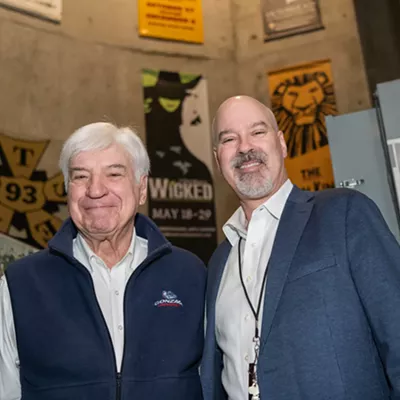For eight years now, Washington state Republicans have had the feeling that every time they get a chance to take over the governor's mansion in Olympia, they trip and fall flat on their faces. Back in 1996, a crowded primary election winnowed the Republican field down to Ellen Craswell. Her base of social conservatives overwhelmed the rest of the field, but in the general election against Gary Locke, she was a disaster.
Four years later, the party settled on a talk radio host, John Carlson. Even though he put a handsome face on the party, his endless hours of airtime were combed through, uncovering all kinds of crazy, right-wing assertions. He became another piece of roadkill on Locke's two-term express.
Not again, Republicans have promised. And they showed they meant it this election season by offering just one candidate for governor: former state Sen. Dino Rossi. No primary election bloodbath this time.
Meanwhile, Democrats have become pretty comfortable. It seems to be their race to lose, and despite a somewhat nasty primary against Ron Sims, in nominating the state's second-most recognized Democrat -- Attorney General Chris Gregoire -- they, too, seem to have settled on their best possible candidate.
Rossi is betting that questions about the economy will swing the state over to his way of thinking. He wants to do anything and everything he can -- from cutting regulations to lessening the tax burden -- to spur a more business-friendly climate. Gregoire is presenting her experience as the key to her future success. For her, the economy is only part of a multi-issue campaign to improve the state's quality of life. She disagrees with the kinds of sweeping changes Rossi advocates. So perhaps it's dramatic change versus fine-tuning.
Gov. Locke says any plan is going to have to face the reality that the state is not out of the woods when it comes to budget problems. "Our state is recovering faster than the rest of the country," says Locke, "but we're going to continue to have some tough budget problems."
Dino Rossi
The budget as a looming issue appears to play to Rossi's strengths; for discussion out on the campaign trail, his favorite accomplishment has been his work wrangling a budget agreement out of Olympia without raising taxes. Many programs, however -- including education -- were cut.
"Lucky me, I became chairman of the Ways and Means Committee during the biggest deficit in history," says Rossi, who represented Issaquah, a suburb east of Seattle.
Jim West, now mayor of Spokane but the chairman of the Ways and Means Committee before Rossi, says that budget was a rare piece of work. "I see a characteristic [in Rossi] that is very unusual in politics today," says West, "and that's this incredible ability to reach across partisan divides."
Rossi spent time on the budget with individual Democrats; some said it was the first time a Republican had ever asked for their advice, West recalls. "When he faced that budget, he had the majority," says West. "He could have written it the way he wanted to."
"I was never successful in Olympia by declaring war on anyone," says Rossi, who left his seat earlier this year to campaign full time.
While the budget is a favorite subject, Rossi is carefully avoiding any hot-button issues. On the war in Iraq, he says the governor of Washington is not in charge of world peace. On abortion, he says he's not running for the Supreme Court. (He has supported anti-abortion efforts in the past.)
Rossi is sticking to business issues -- although he is pushing for more funding for state parks to perhaps break out of the traditional Republican mold even more. It's been a wise strategy so far, because he has to make himself appealing to left-leaning Western Washington if he wants to win.
"I'm an eclectic Republican from a conservative Democratic family," Rossi says. "My approach will be just like it was in the [state] senate. I'm willing to bring people together who want to work together."
To drive home his point, Rossi loves to talk about the "Dinocrats" -- his legion of converted Democrats who are supporting his campaign. It sounds good, and it offers a clean break from the likes of Craswell and Carlson. But in these final weeks of the campaign, Democrats have begun to question whether he really is more conservative than he's letting on. Last spring, in a story never denied by Rossi, he elicited groans by telling a gathering of UW professors that the last book he had read was Treason by Ann Coulter. Democrats continue to point out that he supported plans that would have eliminated health coverage for 40,000 kids. And the family dog is named "Dubya."
"Dino is very, very conservative," says Locke, "just as conservative as Ellen Craswell."
"Look, they've got to demonize him," counters West, who spent a week at the Rossi home after being hospitalized in 2003. "But he's not talking about those philosophical divides. He's talking about getting the state moving again."
That is where every conversation with Rossi ends. "We have to turn the business climate around," he says, pointing to a recent report that ranked Washington as the nation's fifth most regulated state.
Rossi says he represents change in this race because, he says, Gregoire has been in government for her entire career. Rossi says his 21 years in business will serve him well as governor.
"We've had the same people running the show for 20 years," says Rossi. "Olympia needs a fresh set of eyes dealing with the problems."
Chris Gregoire
Staying on track is fine with Gregoire; after all, she says things are nowhere nearly as bad as Rossi is portraying them. "I'm not saying we don't have problems in this state," says Gregoire, "but constantly beating ourselves up and sending the message that we're not a good place to do business is a self-fulfilling prophecy. It's the wrong message."
Locke agrees, saying that despite Rossi's campaign rhetoric, Washington is doing better than many states. He claims 280,000 jobs have been added in Washington in the past eight years, and that there are 30 states with bigger tax burdens than Washington's.
"We can always do better," says Locke, "but nine national companies chose to move here [recently], and we were competing against Oregon, Idaho, Montana and northern California."
Gregoire says the best way to improve the state's business climate is to make it a great place to live. She doesn't rule out addressing onerous regulations, but she says focusing on offering help to employers in providing health insurance will make a bigger impact, especially on small businesses. "Well-intentioned employers simply can't do it alone any more. Fourteen months ago, I would have told you we have a health care problem," she continues. "Today I say we have a health care crisis."
And education is another priority. "What they cut in Olympia, they raise in tuition," says Gregoire of the rising costs at state colleges. "That's wrong."
Gregoire is also supportive of efforts in Spokane to add more facilities to the University District -- and she's following the study of the possibility of some kind of medical school in Spokane. "I have seen just a huge change in Spokane," says Gregoire, who spent eight years in Spokane from 1974-82 (her law degree is from Gonzaga). "There is a unified commitment to that University District."
Gregoire, known for being very tough when she needs to be, says she is ready to lead a large, complex organization; after all, she points out that the AG's office is a perfect place to start because she represents every state agency and all elected officials. Currently, five governors have experience as attorneys general.
"I don't think there's a better training ground," says Gregoire. "And frankly, you see what's going well and what's not going well." When asked to name an agency where it's not going well, without missing a beat she answers, "DSHS," calling it an embarrassment.
Locke agrees that Gregoire is ready for the job. "She's a proven leader," Locke says. "She won for the state just over $4.5 billion from the tobacco settlement. She initiated the agreement on the cleanup of Hanford, and that [contract was so tightly written] that it has kept them from cutting back when they have wanted to."
Gregoire has been criticized when her office missed a court-filing deadline, which led to the payment of a $17 million settlement the state was trying to appeal. Rossi has called it a big coverup; Gregoire says she accepts responsibility for the mistake and has made changes to fix it.
West says Gregoire is "too bureaucratic, too much of what we've already got. Her first instinct would be to protect the system instead of protecting the taxpayers."
Gregoire says she regrets how nasty the campaign has been -- she characterizes her "tough" ads as simply a case of "having to fight back." Still, she's trying to be create a difference between herself and Rossi with optimism. "He is constantly tearing the state down," says Gregoire. "I think it's a great state."
If Locke is right about more tough financial decisions ahead-- and all the evidence suggests he is -- neither Gregoire nor Rossi will be able to deliver on every issue they like to talk about. Each candidate has an innovative funding idea or two, but for the most part, money questions are tough for them to answer. The simple fact is this state has way more needs than it can afford.
So maybe this decision comes down more to a question of who is more competent to run a large organization. Or maybe it's a question of whose priorities deserve to be atop the state's agenda. Or maybe it really will come down to how the TV ads are framing the debate. Is Rossi too conservative? Or is Gregoire too much of an Olympia insider? Both portrayals are caricatures, but which one scares Washington voters more may just go a long way toward deciding who will become the next governor.
Joel Smith contributed to this report.
Publication date: 10/21/04




















